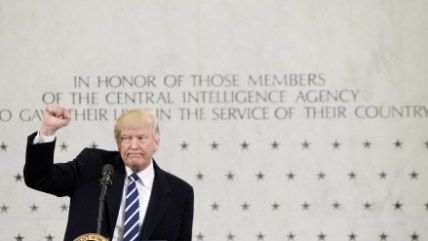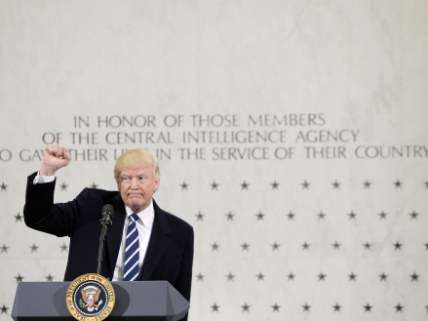Leaks Aside, the Trump Administration Still Wants to Snoop on You
White House does not want federal surveillance authorities reformed.


One might think that, given that the Trump administration is struggling with national security staff leaks that appear to be designed to cause them political harm (at the very least), they'd maybe realize some of the risks of overly expansive surveillance authority and what happens when secretive government officials are in everybody else's business.
But no, they're no really different from other politicians who want one set of rules for themselves and another for the rest of us. According to Reuters, the White House just announced that it does not want Congress to make any changes or reforms that would reduce the authority of federal intelligence agencies to engage in surveillance, even if compromises Americans' privacy.
During this session of Congress, Section 702 of the Foreign Intelligence Surveillance Act (FISA) Amendments Act will sunset. Section 702 grants the National Security Agency (NSA) fairly broad authority to engage in electronic surveillance against foreign targets.
While the basic concept that the NSA should be snooping on potentially hostile foreign actors overseas is uncontroversial to most Americans, what has become abundantly clear over the past several years is that any and all surveillance powers granted to the feds ends up being used in extremely broad ways many Americans didn't realize. Under the authorities granted by 702, data and communications from and by Americans have been scooped up during these investigations. And the broad authorities granted federal investigators have given them a path to get private information about Americans without having to get a warrant and to keep it all secret from them in cases that extend not just to the war on terror but to domestic crimes.
The massive extent of federal government surveillance was exposed to Americans by the leaks of Edward Snowden. Wasn't the USA Freedom Act, passed in 2015, supposed to end—or at least restrain access—to Americans' private communications? Yes and no. That act focused on the surveillance authorities granted by the Patriot Act and the misuse of them to engage in mass, unwarranted citizens' communication metadata. There are actually several different mechanisms and authorizations that guide federal surveillance. Section 702 is separate from the Patriot Act and also separate from Executive Order 12333, the rules that establish how federal agencies share surveillance data. (President Barack Obama's administration expanded this sharing capacity between agencies right before he left office.)
On Wednesday the House Judiciary Committee had hearings to discuss whether to make changes to 702 before renewing it to better protect the privacy of Americans. We don't even know how many Americans have had their personal communications collected or accessed through Section 702. In December, intelligence officials said they were going to put together a report attempting to estimate how many Americans have had their privacy compromised via Section 702's search mechanisms, but it hasn't happened yet. And it's not certain whether that report is even going to happen now. Sen. Dan Coates, Trump's nominee for director of national intelligence, told the Senate he would do everything he could to get those numbers, but it's not a guarantee.
As Congress mulls what to do, privacy-minded groups like the American Civil Liberties Unions and Human Rights Watch are calling for reforms to put a stop to the use of these snooping tools to engage in warrantless searches of Americans' information. Here's a recent warning from the ACLU:
The government justifies warrantless Section 702 surveillance on the theory that this spying is directed at foreigners — but, once the information is collected, the government routinely trains its sights on Americans instead. The government stores hundreds of millions of communications collected under Section 702 in NSA, CIA, and FBI databases. Then, relying on what's known as the "backdoor search" loophole, analysts use Americans' names and other identifying information to retrieve and examine individuals' private communications. The government employs this technique in ordinary criminal investigations and trials that are unrelated to national security, even though the communications were collected without a warrant. In short, the backdoor search loophole functions as an end-run around the Fourth Amendment.
For anybody who finds themselves in Austin next week for the start of the South by Southwest festival, I'll be moderating a panel on March 10 on issues like Section 702 and other Fourth Amendment and tech-surveillance-related problems and specifically Congress' role in establishing restraints. It may not be clear right now to what extent Congress is willing to take the lead on restraining the surveillance state, but Section 702's pending sunset requires action. What Congress does here—if anything—helps indicate what American citizens should expect from federal lawmakers for the next few years when their Fourth Amendment rights are compromised.
Editor's Note: As of February 29, 2024, commenting privileges on reason.com posts are limited to Reason Plus subscribers. Past commenters are grandfathered in for a temporary period. Subscribe here to preserve your ability to comment. Your Reason Plus subscription also gives you an ad-free version of reason.com, along with full access to the digital edition and archives of Reason magazine. We request that comments be civil and on-topic. We do not moderate or assume any responsibility for comments, which are owned by the readers who post them. Comments do not represent the views of reason.com or Reason Foundation. We reserve the right to delete any comment and ban commenters for any reason at any time. Comments may only be edited within 5 minutes of posting. Report abuses.
Please to post comments


OT: So the meetings that Sessions had with the Russians--the ones we're supposed to be upset over--seem to be over nothing, at least for now.
"The Justice Department said late Wednesday that one of the discussions between Sessions and Sergey Kislyak was an office visit that occurred in Sessions' capacity as a member of the Senate Armed Services Committee. The second conversation took place in a group setting with other ambassadors following a Heritage Foundation speech."
http://tinyurl.com/gsverbo
The criminalization of politics continues, though.
I've been informed that to ever point out hysteria on the Left, no matter how ludicrous (eg. "the Russians are coming!"), means that you are a Trumpist Nazi. This is known
McCarthyism is alive and well on the left.
Hey they left no sense of decency, sir? At long last, have they left no sense of decency?
The answer of course to the above is no, they have absolutely no sense of decency left in them.
The perjury concerns the untrue statement he volenteered under oath that denied these meetings ever took.
*Volunteered
And his motive for providing this misleading information? It follows a well-documented "pattern of obfuscation and evasion on the part of the president's inner circle when it comes to contact with the Russian government."
they're no really different from other politicians who want one set of rules for themselves and another for the rest of us
I'm not sure narrowing this down to politicians is the way to go.
"As Congress mulls what to do, privacy-minded groups like the American Civil Liberties Unions and Human Rights Watch are calling for reforms to put a stop to the use of these snooping tools to engage in warrantless searches of Americans' information."
It doesn't appear that these groups were very concerned about spying over the past eight years. Sure, ACLU wrote some things and made muted criticisms, but now they're more vocal.
This seems to be the good part about having Trump in the presidency. Not that he'll reform these systems, but rather that the Left will suddenly rediscover that these things are 'bad'. I highly doubt that they would have been as vocal if Clinton were in the White House.
The ACLU sued the DOJ of the Obama administration over its unwarranted surveillance. The cases are still in the courts in fact.
I never said that they didn't push back. I said they were not as vocal.
You don't score a point on me this time.
Shack Attack: 2
Me: O
Ahh, so the important thing is that someone is in office who doesn't want to reform those systems so that people who have no power to reform those systems will remember to be against them. Gotcha.
Then, relying on what's known as the "backdoor search" loophole
It's not a loophole if it's performing its intended function. People be dumb.
Some people prefer the backdoor.
The "Backdoor Search Loophole" was my nickname in college.
Sen. Dan Coates, Trump's nominee for director of national intelligence, told the Senate he would do everything he could to get those number
He'll get right on that.
So the Trump people will stand up to some bureaucrats (EPA, HHS, DOE) but not to others. Consider administrations would not, I guess we should consider this a relative win? It's just this White House's war on the intelligence community didn't seem to net the average citizen any win on that front.
Libertarianism means that you regulate the things you think are bad and leave alone the things you think are good. It's potential for self-satisfaction and justification is infinite.
Boring troll has officially become boring. Fuck along, now.
There seem to be words missing from that, but what can you do?
If you've done nothing wrong, you've got nothing to worry about.
So why exactly are Trump and his top officials worried about their secret communications getting out? They aren't doing anything wrong, are they?
John, want to jump on this commentator [rhetorically!] for being homophobic? He deserves it!
The government that does not answer to the people is out of control. They make up their own rules, enforce them on us, and ignore them, as it applies to themselves. I am becoming very cynical that it will ever change.